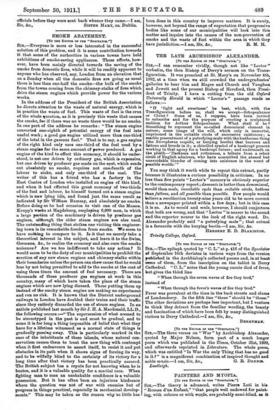SMOKE ABATEMENT.
['To TER EDITOR Or THY "SPECTATOR."]
Sin,—Everyone is more or less interested in the successful solution of this problem, and it is some contribution towards it that some of the authorities in various towns have held exhibitions of smoke-saving appliances. These efforts, how- ever, have been mainly directed towards the saving of the smoke from domestic fires, while it will be readily apparent to anyone who has observed, say, London from an elevation that on a Sunday when all the domestic fires are going as usual there is less than one-half the smoke—the bulk of the smoke from the towns coming from the chimney-stalks of fires which drive the steam engines which provide power for the various works.
In the address of the President of the British Association he directs attention to the waste of natural energy, which is in practice the waste of fuel. This waste of fuel is the crux of the whole question, as it is precisely this waste that causes the smoke, for if there was no waste there would be no smoke. In one part of the address he remarks : " The steam engine converted one-eighth of potential energy of the fuel into useful work ; a good gas engine utilized more than one-third of the total in the gaseous fuel." That is to say, a gas engine of the right kind only uses one-third of the fuel used by a steam engine for the same amount of power produced. A gas engine of the kind to effect this economy, it should be under- stood, is not one driven by ordinary gas, which is expensive, but one driven by producer gas made on the spot, which sends out absolutely no smoke, requires not one-fourth of the labour to stoke, and only one-third of the coal. The writer of this has a friend who has a factory in the East Centre of London who installed an engine of this kind, and when it had effected this great economy of two-thirds of the fuel and labour, he himself turned out a steam engine which is now lying idle, and found just the same result as indicated by Sh• William Ramsay, and absolutely no smoke. Before doing so he had occasion to visit one of the Messrs. Krupp's works at Magdeburg, employing 6,000 men, in which a large portion of the machinery is driven by producer gas engines, although the older steam engines are also used. The outstanding thing that strikes one visiting this engineer- ing town is its remarkable freedom from smoke. We seem to have nothing to compare to it. Is it that we merely take a theoretical interest in the subject, and leave it to the Swiss, Germans, &c., to realize the economy and also cure the smoke nuisance ? Are we too indifferent to take any action P It would seem to be the duty of our municipalities to prohibit the erection of any new steam engines and chimney-stalks within their boundaries unless the person can show cause that he would lose by not being permitted to add to the smoke at the cost of using three times the amount of fuel necessary. There are thousands of these producer gas engines at work in this country, many of which have taken the place of the steam engines which are now lying disused. Those putting them up instead of the smoky steam engine are making no experiment and run no risk. It is known that the District underground railways in London have doubled their trains and their traffic since they entirely discarded the use of steam engines. In an anticle published last month by Sir J. H. A. Macdonald, LL.D., the following occurs :—" The supersession of what seemed to be stereotyped in the past is and must be gradual, and to some it is for long a thing impossible of belief that what they have for a lifetime witnessed as a normal state of things is gradually passing away. This is particularly marked in the case of the inhabitants of these islands, whose natural con- servatism causes them to treat the new thing with contempt when it first endeavours to assert itself, to resist it and put obstacles in its path when it shows signs of forcing its way, and to be wilfully blind to the certainty of its victory for a long time after that victory has been practically assured. The British subject has a repute for not knowing when he is beaten, and it is a valuable quality for a martial race. When fighting man to man an unshakable confidence is a valuable possession. But it has often been an injurious hindrance where the question was not of war with enemies but of progress in things practical, especially in mechanical develop- ments." This may be taken as the reason why 'so little has been done in this country to improve matters. It is surely, however, not beyond the range of expectation that progressive bodies like some of our municipalities will look into this matter and inquire into the causes of the non-prevention of smoke and the waste of fuel within the area in which they have jurisdiction.—I am, Sir, &c., R. M. H.










































 Previous page
Previous page